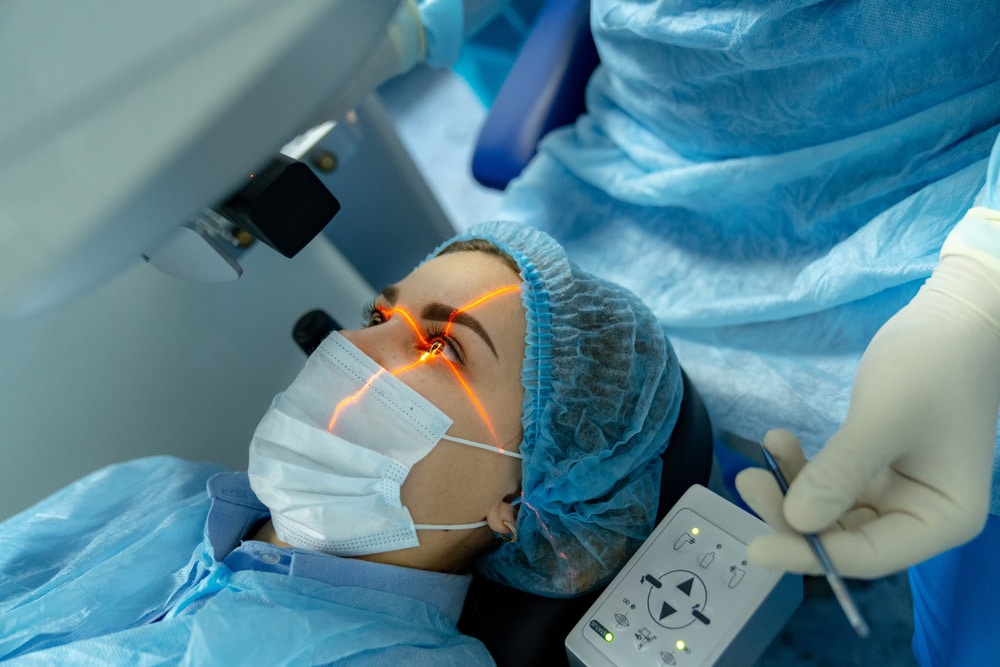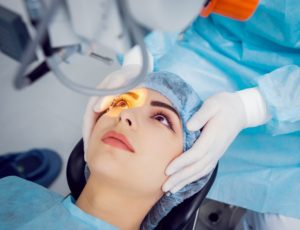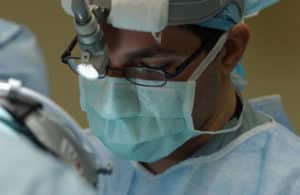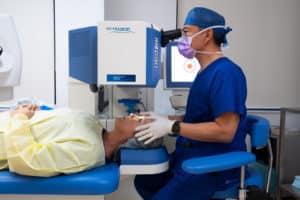Have you ever been curious about how laser eye surgery can improve your vision? These technologies have evolved through years of medical research and technological advances, allowing for better vision after surgery while reducing surgical risk. In this blog post, we’ll explain how laser eye surgery alters the cornea of the eye and can help improve your eyesight.

What Is Laser Eye Surgery?
Laser eye surgery is a procedure that provides a remedy for common vision impairments. It’s a procedure that can reduce the dependency on glasses or contact lenses through the use of high energy focused light to make precise changes to your eye.
Refractive Laser Eye Surgery
Refractive laser eye surgery is typically quick, with most surgeries completed in under 20 minutes. The laser works by changing the shape of the cornea, which is the main focusing lens of the eye. The reason people need glasses or contact lenses is because the cornea isn’t focusing light correctly at the retina (the part of the eye that turns light into an electrical signal to be sent to the brain). The aim of laser eye surgery is to increase or decrease the focusing power of the cornea by changing it’s shape, so light is now correctly focused at the retina allowing for clear vision without the need for glasses or contact lenses.
Laser- Assisted Cataract Eye Surgery
Cataract surgery involves the removal of the cloudy cataract-affected lens, followed by the placement of an intraocular lens (IOL). Instead of using manual instruments to make incisions and remove the cataract, the doctor can instead use a Femtosecond laser to perform most of these steps. In certain situations this method of cataract surgery can be preferred due to decreased surgical risk with some eye conditions.
What Can You Expect During Laser Eye Surgery?
From the initial assessment to the final touches of the laser, here’s what you can expect at each stage of this procedure.
Initial Consultation: The First Step To Clear Vision
Your path to better vision begins with a comprehensive eye examination during your initial consultation. This step is important to ensure laser eye surgery is suitable for you. Your ophthalmologist will assess the overall health of your eyes and the vision corrections needed and discuss your expectations. This is your opportunity to ask questions and understand the process fully.
Preparing For Surgery: Setting The Stage For Success
After determining your suitability, the next phase is preparation. You’ll receive instructions on what to do before the surgery day. This preparation ensures you arrive for your procedure ready and relaxed.
The Day Of Surgery
On the day of your surgery, you’ll be in the capable hands of your ophthalmologist and their team. The procedure itself is swift and efficient, thanks to modern laser technology. You’ll experience minimal discomfort as the laser reshapes your cornea.
Post-surgery: Recovery And Results
Most patients report an improvement in vision shortly after the procedure, with a return to normal activities within days.
Is Laser Eye Surgery Right For You?
Deciding to undergo laser eye surgery is a decision that hinges on various factors, including your eye health, prescription and lifestyle needs. It’s a choice that could potentially reduce your dependence on glasses or contact lenses. However, it’s not a decision to be made lightly. It requires careful consideration of your current vision problems and your eyes’ health.
Assessing Your Suitability
An ophthalmologist will conduct a comprehensive assessment to determine if you’re a candidate for laser eye surgery. This includes an evaluation of your corneal thickness, the stability of your vision and the presence of any eye conditions that may affect the surgery’s outcome.
Understanding The Benefits And Risks
The benefits of laser eye surgery can extend beyond improved vision. Patients that frequently wear contact lenses often experience bad dry eye and can develop an intolerance due to increasing discomfort. Patients that wear glasses can often be bothered by lens distortion and lack of peripheral vision caused by thick glasses. Laser eye surgery can help with these and other side effects caused by glasses and contact lens wear. However, as with any medical procedure, there are risks involved, such as dry eyes, night vision issues or the rare possibility of under or over-correction. A thorough discussion with your ophthalmologist will help you weigh these factors to make a choice that’s right for you.
Contact Pacific Eye Clinic For Laser Eye Surgery
If you’re on the Gold Coast and considering laser eye surgery, remember that choosing a reputable clinic is important. With over 20 years of experience, technology and a commitment to patient care, Pacific Eye Clinic stands ready to help you achieve clear vision. Contact us for more information on our laser eye surgeries.
Author

Dr Marc Wei
Dr. Marc Wei is the principal specialist laser and cataract surgeon at Pacific Eye Clinic in Southport on the Gold Coast. He has 20 years of trusted experience in advanced laser cataract surgery and has completed more than 15,000 procedures over the course of his career.

Dr Marc Wei
Dr. Marc Wei is the principal specialist laser and cataract surgeon at Pacific Eye Clinic in Southport on the Gold Coast. He has 20 years of trusted experience in advanced laser cataract surgery and has completed more than 15,000 procedures over the course of his career.



